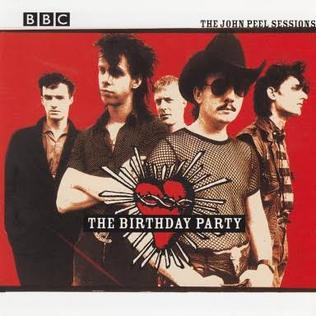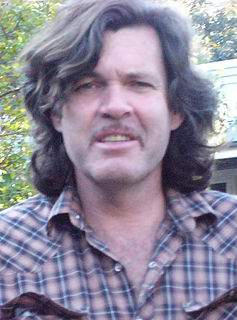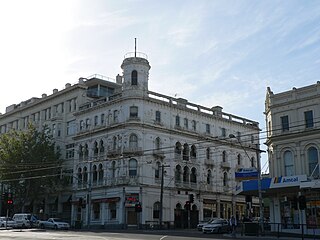
The Saints are an Australian punk rock band originating in Brisbane in 1973. The band was founded by Chris Bailey, Ivor Hay (drummer), and Ed Kuepper (guitarist-songwriter). Contemporaneously with American punk rock band the Ramones, the Saints were employing the fast tempos, raucous vocals and "buzz saw" guitar that characterised early punk rock. With their debut single, "(I'm) Stranded", in September 1976, they became the first "punk" band outside the US to release a record, ahead of better-known acts including the Sex Pistols and the Clash. They are one of the first and most influential groups of the genre.

The Birthday Party were an Australian post-punk band, active from 1978 to 1983. Despite limited commercial success, The Birthday Party's influence has been far-reaching, and they have been called "one of the darkest and most challenging post-punk groups to emerge in the early '80s." The group's "bleak and noisy soundscapes," which drew irreverently on blues, free jazz, and rockabilly, provided the setting for vocalist Nick Cave's disturbing tales of violence and perversion. Their music has been described by critic Simon Reynolds as gothic, and their single "Release the Bats" was particularly influential on the emerging gothic scene.
Sardine v were an Australian post-punk band, formed in 1980 by Ian Rilen on guitar and vocals, and his then-wife, Stephanie Rilen on lead vocals and keyboards. They issued a single, "Sabotage" (1982), and an extended play, I Hate You (1983). Other members included Johanna Pigott on bass guitar and Andrew Garton on saxophone. Sardine v disbanded in 1983.

Clinton Walker is an Australian writer, best known for his works on popular music but with a broader interest in social and cultural history and theory. Sydney's Sun-Herald has called him "our best chronicler of Australian grass-roots culture." Books he's published like Inner City Sound (1981), Buried Country (2000) and History is Made at Night (2012) have had a seminal impact on the Australian music scene. Similarly, while he found best-selling success as Bon Scott's biographer, Walker's non-music books like Football Life (1998) and Golden Miles (2005) have offered an appreciation of subjects hitherto hardly deemed worthy of serious consideration. More recently, in early 2018, he courted controversy when his book Deadly Woman Blues was withdrawn from sale to be pulped after only a couple of weeks on the shelves.

The Little Band scene was an experimental post-punk scene which flourished in Melbourne, Australia from late 1978 until early 1981. Instigated by local group Primitive Calculators, this scene was concentrated in the inner suburbs of Fitzroy and St Kilda, and involved large numbers of short-lived bands, more concerned with artistic expression than commercial success. Frequently changing names, swapping members and sharing equipment, the bands played in small inner-city venues, often pubs, and their music was recorded live and broadcast by radio announcer Alan Bamford on community station 3RRR. In the scene, the distinctions between performers and audience were blurred; many audience members were either in little bands or ended up forming such.

Crime & the City Solution are an Australian rock music band formed in late 1977 by singer-songwriter and mainstay Simon Bonney. They disbanded in 1979 leaving only bootleg recordings and demos, now extremely rare. In late 1983, Bonney traveled to London and in 1985 he formed a new version of the group in the U.K. which included members of the recently disbanded The Birthday Party; later they transferred to Berlin, where they issued four albums – Room of Lights (1986), Shine (1988), The Bride Ship (1989) and Paradise Discotheque (1990) – before disbanding again in 1991. In 2012 Bonney reformed the band in Detroit with two veterans of its Berlin era and a handful of new members.
Laughing Clowns, sometimes written as The Laughing Clowns, is a post-punk band formed in Sydney in 1979. In five years, the band released three LPs, three EPs, and various singles and compilations. Laughing Clowns' sound is free jazz, bluegrass and krautrock influenced. The band formed to accommodate Ed Kuepper's growing interest in expanding brass-driven elements he had brought to The Saints' third album, Prehistoric Sounds, and by adopting flattened fifth notes in a rock and roll setting while using a modern jazz styled band line-up.
→ ↑ → was an Australian music, art and performance group, best known for their experimental music. They formed in Melbourne in 1977 and were led by Philip Brophy. The group performed music, produced artwork, films, videos, live theatre, multi-media, and wrote literature.
The Last Words were an Australian punk rock group formed in 1977 by mainstays Malcolm Baxter on lead vocals, and his song writing partner, Andy Groome on guitar. Their debut single, "Animal World", was released on their own label, Remand Records. A self-titled album appeared in December 1980 but the group disbanded in the following year.

Prehistoric Sounds is the third album by the Australian punk rock group The Saints, released in 1978 via Harvest. This was the final album to feature founding lead guitarist, Ed Kuepper, who left the band shortly after its release. In October 2010, the album was listed in the top 50 in the book, 100 Best Australian Albums with their debut, (I'm) Stranded, at No. 20.
Australian musicians played and recorded some of the earliest punk rock. The Saints released their first single in 1976. Bands playing subgenres or offshoots of punk music, such as local hardcore acts, still have a strong cult following throughout Australia. Fans started to form bands, both punk and dissimilar in sound, beginning a distinct Brisbane punk scene, one of the first in the world. By 1977, other bands were starting to form in Sydney, under the influence of local and overseas punk acts. These bands and other Australian and overseas punk acts were strongly supported by public radio stations. The Young Charlatans had formed in Melbourne out of the ashes of earlier bands. During the late 1970s, former members of Radio Birdman contributed to several new Sydney bands. The Quick and the Dead, who played in Perth during 1979–81, pioneered a sound closely related to Oi!.
Pel Mel were an Australian rock band, which formed in Newcastle in June 1979. They issued two studio albums, Out of Reason (1982) and Persuasion (1983). They toured until the end of 1984 and disbanded in the following year. They reformed in 2012 as Pel Mel Organisation to play occasional shows; they have released a compilation and a live album in 2016.
Brisbane punk rock had its main impact between 1975 and 1984 as part of the overall punk rock scene in Australia. According to rock music historian, Ian McFarlane, the Queensland capital provided "some of the most anarchistic bands" of that era whilst it was "arguably the most conservative city" in the country. The development of the local punk movement differed from other cities because of its relative geographic isolation from other similar trends. The Brisbane scene also received a greater scrutiny by local police where early punk bands formed as "an obvious backlash to an oppressed society". This generated antagonistic and individualistic groups or "snot" driven punk bands.
Wrong Kind of Stone Age was an Australian post-punk band formed in 1983 in inner-city Sydney by Gavin Williams and Miriam Williamson. The early Wrong Kind of Stone Age sound was a unique and wild fusion of post-punk attitude and bottom-heavy sonic distortion with strong dub and tribal influences, using Miriam's vocal range. They used occasional tape montage, didgeridoo, clarinet, or electronic noise.
Johnny Dole & the Scabs were an early Australian punk rock group formed in 1977 by Terry Walsh on lead vocals, Dave Berry on bass guitar and vocals, Peter Mullany on guitar and Greg Morris on drums and vocals. They disbanded early in the following year. A compilation album, Scab Animal 1977, was released in 1996. Terry Walsh died on 9 August 1987, aged 33.
Post-punk is a broad genre of rock music which emerged in the late 1970s as artists departed from the raw simplicity and traditionalism of punk rock, instead adopting a variety of avant-garde sensibilities and non-rock influences. Inspired by punk's energy and DIY ethic but determined to break from rock cliches, artists experimented with styles like funk, electronic music, jazz, and dance music; the production techniques of dub and disco; and ideas from art and politics, including critical theory, modernist art, cinema and literature. These communities produced independent record labels, visual art, multimedia performances and fanzines.

The Crystal Ballroom was a music venue located within the Seaview Hotel on Fitzroy Street in the inner Melbourne suburb of St Kilda. It has often been referred to as the centerpiece of Melbourne's post-punk movement.
The Grand Hotel is a former pub located at Broadway, Railway Square, in the suburb of Haymarket, Sydney in the state of New South Wales, Australia.

"Shivers" is a song by the Australian post-punk band the Boys Next Door, who would later become the Birthday Party. It is the tenth and final track from the band's debut studio album Door, Door, released in 1979 on Mushroom Records. It was released as the album's only single in May 1979, backed with the B-side "Dive Position".

Terrence Michael Walsh was a singer, song writer and musician. Born in Liverpool, England and migrated to Sydney, Australia with his mother and father in early 1962. He is best known as Johnny Dole, lead singer and one of the founding members of the Sydney Punk Rock band Johnny Dole & The Scabs (1977–78).








